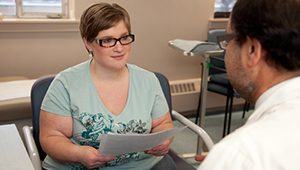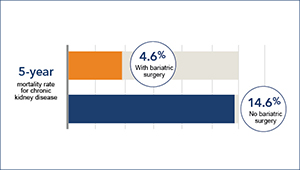Obesity
Research overview
“Obesity is the number-one health problem in the United States because it negatively affects our population’s health more than any other condition,” said Kaiser Permanente Washington Health Research Institute Senior Investigator David Arterburn, MD, MPH. Kaiser Permanente Washington researchers are doing practical research to learn how doctors, patients, families, employers, and policymakers can best work together to prevent and treat obesity.
“We’re focusing on three ways to halt the obesity epidemic,” said Senior Investigator Dori Rosenberg, PhD, MPH. “We’re helping to change obesity-promoting environments, bringing evidence-based prevention and treatment programs into health care systems, and helping people develop lifelong healthy diet and activity habits.”
Kaiser Permanente Washington obesity research areas include:
- reducing sedentary behavior and promoting physical activity and healthy diet in various age groups, populations with chronic conditions, and families;
- shared decision making to help patients find the best way to a healthy weight;
- implementing health coaches in primary care to support behavior changes;
- social networks that support lifestyle change programs;
- relationships between medications and genetic factors in developing obesity;
- health system, community, and national policies that address obesity;
- relationships between obesity and depression, diabetes, and other conditions; and
- long-term benefits and risks of bariatric (weight loss) surgery.
“Obesity is caused by many factors, so at Kaiser Permanente Washington, we’re working on many levels,” said Paula Lozano, MD, MPH, a senior investigator and Kaiser Permanente Washington’s assistant medical director for preventive care. “We’re improving health care to help people who are obese now. But since obesity is a societal problem, we’re also studying how to change our homes and workplaces and neighborhoods to create more healthy environments.”
Recent publications on Obesity
Lewis KH, Arterburn DE, Zhang F, Callaway K, Wallace J, Fernandez A, Ross-Degnan D, Wharam JF Comparative Effectiveness of Vertical Sleeve Gastrectomy Versus Roux en y Gastric Bypass for Diabetes Treatment: A Claims-based Cohort Study 2021 May;273(5):940-948. doi: 10.1097/SLA.0000000000003391. PubMed
Li RA, Liu L, Arterburn D, Coleman KJ, Courcoulas AP, Fisher D, Haneuse S, Johnson E, Theis MK, Yoon TK, Fisher H, Fraser JR, Herrinton LJ Five-year Longitudinal Cohort Study of Reinterventions After Sleeve Gastrectomy and Roux-en-Y Gastric Bypass 2021 Apr;273(4):758-765. doi: 10.1097/SLA.0000000000003401. PubMed
Klasnja P, Rosenberg DE, Zhou J, Anau J, Gupta A, Arterburn DE A quality-improvement optimization pilot of BariFit, a mobile health intervention to promote physical activity after bariatric surgery 2021 Mar 16;11(2):530-539. doi: 10.1093/tbm/ibaa040. PubMed
Thaweethai T, Arterburn DE, Coleman KJ, Haneuse S ROBUST INFERENCE WHEN COMBINING INVERSE-PROBABILITY WEIGHTING AND MULTIPLE IMPUTATION TO ADDRESS MISSING DATA WITH APPLICATION TO AN ELECTRONIC HEALTH RECORDS-BASED STUDY OF BARIATRIC SURGERY 2021 Mar;15(1):126-147. doi: 10.1214/20-aoas1386. PubMed
Moore DD, Arterburn DE, Bai Y, Cornejo M, Crawford CL, Drewnowski A, Gray MF, Ji M, Lewis KH, Paz S, Taylor B, Yoon TK, Young DR, Coleman KJ The Bariatric Experience Long Term (BELONG): Factors Related to Having Bariatric Surgery in a Large Integrated Healthcare System 2021 Feb;31(2):847-853. doi: 10.1007/s11695-020-05045-7. Epub 2020-10-30. PubMed
Researchers in Obesity
 David E. Arterburn, MD, MPHSenior Investigator |
 Allen Cheadle, PhDSenior Investigator, KPWHRI; Senior Research Associate, CCHE |
 Andrea J. Cook, PhDSenior Biostatistics Investigator |
 Maricela Cruz, PhDAssociate Biostatistics Investigator |
 Nicole M. Gatto, PhD, MPHPrincipal Collaborative Scientist |
 Beverly B. Green, MD, MPHSenior Investigator |
 Mikael Anne Greenwood-Hickman, MPHSenior Collaborative Scientist |
 Paula Lozano, MD, MPHSenior Investigator; Director, ACT Center |
 Dori E. Rosenberg, PhD, MPHSenior Investigator |
 Gregory E. Simon, MD, MPHSenior Investigator |











